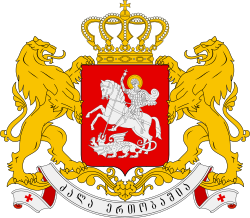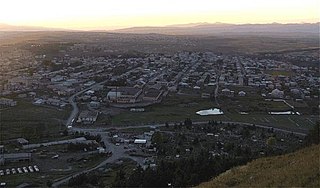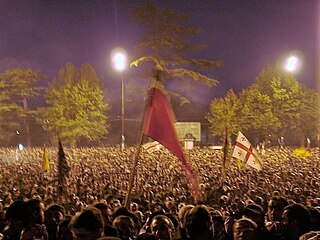 |
|---|
| This article is part of a series on the politics and government of Georgia |
Legislature |
Judiciary |
Local elections were held in Georgia on October 5, 2006. The elections follow a decree issued on August 26 by President of Georgia Mikheil Saakashvili, setting the date for the local ballot.

Georgia is a country in the Caucasus region of Eurasia. Located at the crossroads of Western Asia and Eastern Europe, it is bounded to the west by the Black Sea, to the north by Russia, to the south by Turkey and Armenia, and to the southeast by Azerbaijan. The capital and largest city is Tbilisi. Georgia covers a territory of 69,700 square kilometres (26,911 sq mi), and its 2017 population is about 3.718 million. Georgia is a unitary semi-presidential republic, with the government elected through a representative democracy.
A decree is a rule of law usually issued by a head of state, according to certain procedures. It has the force of law. The particular term used for this concept may vary from country to country. The executive orders made by the President of the United States, for example, are decrees. In non-legal English usage, however, the term refers to any authoritarian decision. Documents or archives in the format of royal decrees or farming were issued by rulers.

The President of Georgia is the constitutional Head of State of Georgia as well as the Supreme Commander-in-Chief of the Defense Forces. They represent Georgia in foreign relations. The constitution defines the presidential office as "the guarantor of the country’s unity and national independence."
This vote was considered to be the first major test of the authorities commitment to a transparent process in non-revolutionary circumstances. In addition they were to demonstrate the level of public confidence in both the NMD - after a series of scandals - and the opposition, which has begun to strengthen and reorganise that year.
The elections coincided with a very tense period of relations with Russia. After a major diplomatic row regarding alleged Russian spying, the Kremlin has severed all transport and post links with Georgia.

Russia, officially the Russian Federation, is a transcontinental country in Eastern Europe and North Asia. At 17,125,200 square kilometres (6,612,100 sq mi), Russia is by far or by a considerable margin the largest country in the world by area, covering more than one-eighth of the Earth's inhabited land area, and the ninth most populous, with about 146.77 million people as of 2019, including Crimea. About 77% of the population live in the western, European part of the country. Russia's capital, Moscow, is one of the largest cities in the world and the second largest city in Europe; other major cities include Saint Petersburg, Novosibirsk, Yekaterinburg and Nizhny Novgorod. Extending across the entirety of Northern Asia and much of Eastern Europe, Russia spans eleven time zones and incorporates a wide range of environments and landforms. From northwest to southeast, Russia shares land borders with Norway, Finland, Estonia, Latvia, Lithuania and Poland, Belarus, Ukraine, Georgia, Azerbaijan, Kazakhstan, China, Mongolia and North Korea. It shares maritime borders with Japan by the Sea of Okhotsk and the U.S. state of Alaska across the Bering Strait. However, Russia recognises two more countries that border it, Abkhazia and South Ossetia, both of which are internationally recognized as parts of Georgia.
According to preliminary results, the elections were won by the United National Movement led by President Saakashvili with an overwhelming majority. The predominantly Armenian-populated city of Akhalkalaki was the only municipality where an opposition grouping, the Industry Will Save Georgia Party, won a majority of votes. According to international observers, particularly the OSCE Office for Democratic Institutions and Human Rights (ODIHR) and the Congress of Local and Regional Authorities of the Council of Europe, the "municipal elections in Georgia were conducted with general respect for fundamental freedoms; however, the blurred distinction between the ruling authorities and the leading party reinforced the advantage of the incumbents". [1]

United National Movement is the opposition political party in the nation of Georgia.

Akhalkalaki is a town in Georgia's southern region of Samtskhe–Javakheti. Akhalkalaki lies on the edge of the Javakheti Plateau. The city is located about 30 kilometres (19 mi) from the border with Turkey. In 2002 over 90 percent of the city's population were ethnic Armenians. The city was passed from Ottomans to Russians after Russo-Turkish War (1828–1829). On January 4, 1900, an earthquake destroyed much of the town and killed 1,000 people in the area. As of the 2014 census the town had a population of 8,295.

The Council of Europe is an international organisation whose stated aim is to uphold human rights, democracy and the rule of law in Europe. Founded in 1949, it has 47 member states, covers approximately 820 million people and operates with an annual budget of approximately 500 million euros.










